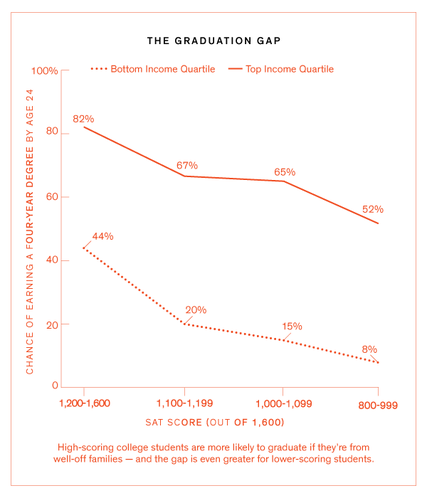How should the U.S. improve college graduation rates?

Go Deeper.
Create an account or log in to save stories.
Like this?
Thanks for liking this story! We have added it to a list of your favorite stories.

"When you look at the national statistics on college graduation rates, there are two big trends that stand out right away. The first is that there are a whole lot of students who make it to college — who show up on campus and enroll in classes — but never get their degrees. More than 40 percent of American students who start at four-year colleges haven’t earned a degree after six years. If you include community-college students in the tabulation, the dropout rate is more than half, worse than any other country except Hungary," writes Paul Tough in the New York Times.
The second trend is that whether a student graduates or not seems to depend today almost entirely on just one factor — how much money his or her parents make. To put it in blunt terms: Rich kids graduate; poor and working-class kids don’t. Or to put it more statistically: About a quarter of college freshmen born into the bottom half of the income distribution will manage to collect a bachelor’s degree by age 24, while almost 90 percent of freshmen born into families in the top income quartile will go on to finish their degree.
When you read about those gaps, you might assume that they mostly have to do with ability. Rich kids do better on the SAT, so of course they do better in college. But ability turns out to be a relatively minor factor behind this divide. If you compare college students with the same standardized-test scores who come from different family backgrounds, you find that their educational outcomes reflect their parents’ income, not their test scores. Take students like Vanessa, who do moderately well on standardized tests — scoring between 1,000 and 1,200 out of 1,600 on the SAT. If those students come from families in the top-income quartile, they have a 2 in 3 chance of graduating with a four-year degree. If they come from families in the bottom quartile, they have just a 1 in 6 chance of making it to graduation.
Today's Question: How should the U.S. improve college graduation rates?
Paul Tough will speak at the Top Coast Festival in Minneapolis. He authored How Children Succeed: Grit, Curiosity, and the Hidden Power of Character, a New York Times bestseller that has been translated into 22 languages. Tough is a contributing writer to New York Times Magazine, where he's reported on education, parenting, poverty and politics. He's also worked as a reporter and a producer on WBEZ's This American Life, and he was the founding editor on Open Letters. He lives in New York.
Turn Up Your Support
MPR News helps you turn down the noise and build shared understanding. Turn up your support for this public resource and keep trusted journalism accessible to all.


